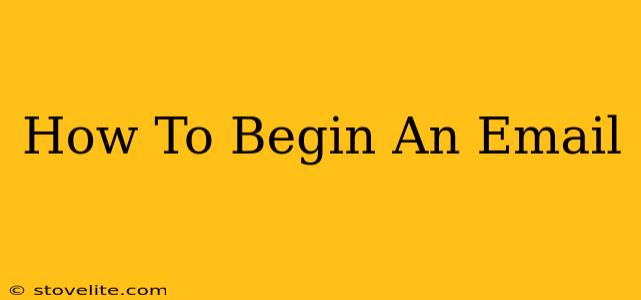Starting an email right is crucial. A strong opening sets the tone, grabs attention, and increases the likelihood of your email being read and responded to. This guide will walk you through various email opening strategies, helping you choose the best approach for different situations and recipients.
Understanding Your Audience: The Key to a Great Email Opening
Before you even think about writing your opening line, consider who you're emailing. Are you writing to a potential client, a colleague, a friend, or a family member? The formality and tone of your opening should reflect your relationship with the recipient.
Formal Email Openings:
- "Dear [Name],": This classic and respectful opening is suitable for most professional communications. It's straightforward, professional, and leaves no room for misinterpretation.
- "Good morning/afternoon/evening [Name],": Adding a time-of-day greeting adds a personal touch while maintaining a professional tone.
- "To Whom It May Concern,": Use this only when you don't know the recipient's name. It's less personal but still appropriate for formal situations.
Informal Email Openings:
- "Hi [Name],": A simple and friendly opening perfect for colleagues, friends, and family.
- "[Name],": Even more concise than "Hi [Name]," this works well for people you know well and with whom you have an established rapport.
- "Hey [Name],": A casual and friendly greeting, best reserved for close colleagues or friends.
Crafting Compelling Opening Lines: Beyond the Greeting
After the greeting, your opening needs to clearly state your purpose. Avoid vague or overly lengthy introductions. Here are some effective strategies:
Direct and to-the-point:
- "I'm writing to follow up on…": Perfect for reminders or requests for updates.
- "I'm emailing to request…": Clearly states the purpose of your email from the outset.
- "I wanted to share…": Suitable for sharing information or news.
Engaging and intriguing:
- "I came across your work on…": A great opener if you're contacting someone you admire.
- "I was impressed by your…": Similar to the above, expressing specific admiration makes your email stand out.
- "I have an idea that could…": Creates intrigue and sparks curiosity, particularly useful in business contexts.
Remember to tailor your opening to the specific context of your email. A generic opening will likely be ignored, while a personalized and relevant opening will immediately capture the recipient's attention.
Things to Avoid in Your Email Opening:
- Overly casual language or slang: Unless you know the recipient very well, maintain a professional tone.
- Generic greetings: Avoid phrases like "Hope you're having a great day" unless they're genuinely relevant to the conversation.
- Long-winded introductions: Get straight to the point; respect the reader's time.
- Misspellings and grammatical errors: Proofread your email carefully before sending.
By carefully crafting your email opening, you dramatically increase your chances of getting a response and achieving your communication goals. Practice different approaches and find what works best for you and your audience. Remember, a well-written email opening is an investment in effective communication.

